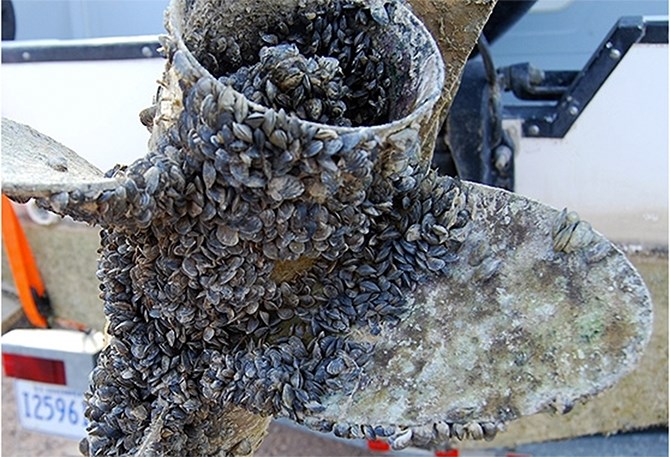
B.C. Conservation Officer Sgt. Josh Lockwood and Kilo, Canada's first invasive mussel-sniffing dog is pictured with Premier Christy Clark at a news conference in West Kelowna this afternoon, Thursday, March 30, 2017.
(JENNA HICKMAN / iNFOnews.ca)
March 30, 2017 - 12:14 PM
KELOWNA – A multi-million dollar funding boost from the provincial government will go to a variety of areas in the battle against invasive mussels, including the addition of Canada's first mussel-sniffing dog.
Funding will go towards two new inspection stations, expanded inspection hours and an expanded season. Additionally, there will be added inspectors and expanded scientific lake monitoring.
However, according to Kelowna-Mission MLA Steve Thomson, increased education is a top priority.
"We have to focus on education too," Thomson says. "We can do all we want on an enforcement level but we all need to understand the threat these mussels pose, not only to our waterways but to the Okanagan and provincial economy."
Invasive mussels are extremely damaging to the environment and the B.C. Invasive Mussel Program is serious about ramping up efforts to keep them out of the waterways.
"Invasive mussels threaten critical salmon habitat, damage infrastructure, and prevent full recreational use of our lakes and beaches," Dr. Brian Heise, Invasive Species Council chair says.

FILE PHOT - A boat propeller engulfed with quagga mussels.
Image Credit: SUBMITTED/US National Parks Service
The high traffic Golden mussel inspection station on the Trans Canada Highway will be the only station to be open 24 hours. The other stations will be open from dawn to dusk, starting April 1 and going until Oct. 31. Thirty-five new inspection operators will suit up as well, doubling the current number.
Kilo the German shepherd is currently undergoing training. In a few months he will be able to sniff out mussels, firearms, bear parts and will be used in evidence recovery cases. Kilo starts on July 1 and will work with his handler at high volume stations on a rotating schedule to detect invasive mussels.
Of the funding, $2.45 million is designated for increased staffing, $450,000 is pledged over three years for the Habitat Conservation Trust Foundation lake monitoring program and $170,000 going towards equipment for the enhanced program.
Annually the program uses $4.5 million in total funding. Funding from BC Hydro, Columbia Power, Fortis BC and Columbia Basin Trust supplements the provincial contributions.
It's illegal to transport invasive mussels in B.C. and it's mandatory for boaters to report to inspection stations. A fine of $345 can be issued for failing to stop at an inspection station. A $50,000 fine can be issued for a first time offence for transporting mussels in B.C.
"We have to work together to stop these invasive mussels," B.C. Premier Christy Clark says. "This additional funding is certainly a step in the right direction."
Over the 2016 boating season, 24,500 boats were inspected in B.C. Officers stopped 17 mussel infected watercraft last year.
— This story was updated at 1:30 p.m., Thursday, March 30, 2017 with more details and a photo from the news conference.
To contact a reporter for this story, email Kim Anderson or email the editor. You can also submit photos, videos or news tips to the newsroom and be entered to win a monthly prize draw.
We welcome your comments and opinions on our stories but play nice. We won't censor or delete comments unless they contain off-topic statements or links, unnecessary vulgarity, false facts, spam or obviously fake profiles. If you have any concerns about what you see in comments, email the editor in the link above.
News from © iNFOnews, 2017